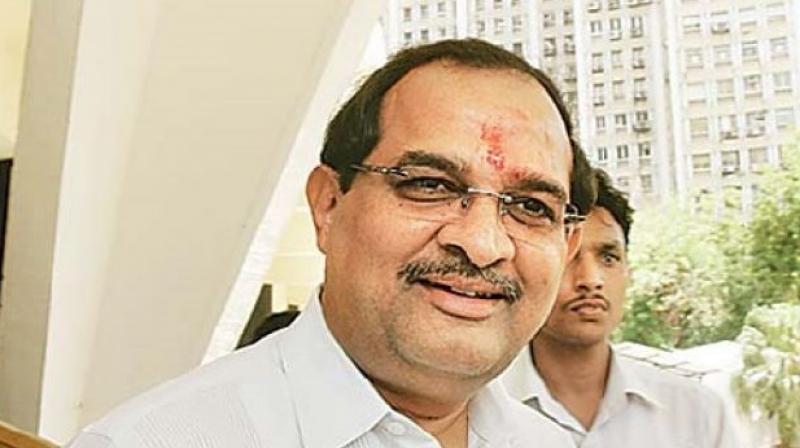A powerful family in Maha with cross-party loyalties: Radhakrishna Vikhe Patil
Members of the Vikhe Patil family, whose interests go beyond politics, have been part of almost all major parties in the last 70 years.

Mumbai: Congress leader Radhakrishna Vikhe Patil's son joining the BJP may be seen as a setback for the opposition party in Maharashtra, but it does not come as a surprise to the political pundits who point to the family's history of shifting loyalties.
The Vikhe-Patils, based in Ahmednagar district, are a formidable name in Maharashtra's political history and also considered pioneers of the sugar co-operative movement in the state. Sujay Vikhe Patil, the son of the Leader of Opposition in the Assembly Radhakrishna Vikhe Patil, joined the BJP on March 12 and is tipped to be its candidate from his preferred Ahmednagar Lok Sabha constituency. Members of the Vikhe Patil family, whose interests go beyond politics, have been part of almost all major parties in the last 70 years. The biggest contribution of the family in Maharashtra has been its role in setting up Asia's first cooperative sugar mill in Ahmednagar right after independence by late Vitthalrao Vikhe Patil under the guidance of then Congress stalwart Dhananjayrao Gadgil. It changed the rural economy and introduction of sugarcane as a cash crop contributed to uplift of people in villages and towns in several parts of Maharashtra. The family flourished under the leadership of Balasabhe Vikhe Patil, the son of Vitthalrao Vikhe Patil.
Under Balasabhe Vikhe Patil, the family entered the education sector where it set up schools, medical and engineering colleges and also social organisations, thereby expanding its dominance in western Maharashtra. Balasaheb Vikhe Patil, who was in the Congress for a long time, won the erstwhile Ahmednagar North Lok Sabha seat seven times. Before joining the Congress, Balasaheb Vikhe Patil was closely associated with the Communist Party of India. His past communist link was not ignored by senior Congress leaders who used it to question his "loyalty" to the party, said Bal Bothe-Patil, a journalist from Ahmednagar district. When the then Prime Minister Indira Gandhi imposed Emergency in 1975, Balasaheb Vikhe Patil left the Congress like many other leaders in those days and became chairman of the Maharashtra Samajwadi Congress in 1978 along with his party colleague from Nanded, Shankarrao Chavan. However, both returned to the Congress fold when Indira Gandhi stormed back to power after losing the post-Emergency Lok Sabha polls. "The Vikhe Patils could not stay away from power for long.
The same pattern was followed by his son (Radhakrishna Vikhe Patil) and grandson Sujay, who is now in the BJP," said Bothe-Patil, whose doctorate thesis was on political parties in Ahmednagar district since independence. Balasaheb Vikhe Patil again rebelled against former Prime Minister Rajiv Gandhi in 1989, and under the leadership of V P Singh formed a political group, the Congress Forum for Action, that roped in 45 MPs across the country, he said. It was a strong message to other Congress leaders from Maharashtra, including Sharad Pawar, that the clout of the Vikhe Patils is growing, Bothe-Patil added. "The biggest-ever rift in Congress was witnessed when Balasaheb Vikhe Patil, defeated in polls, in early 1990s filed a lawsuit against (then) Congress leader Sharad Pawar for his alleged suggestion over acceptance of freebies. "Though Pawar (who later quit the Congress and formed NCP) had to face the Supreme Court's strictures, (it appears that) he did not forget the case," he claims. This may be the reason behind the NCP's refusal to drop its claim on the Ahmednagar Lok Sabha constituency as part of its seat-sharing agreement with the Congress for the upcoming polls, he said. Pawar's "stubbornness" left Sujay Vikhe Patil with no other option but to join the BJP, probably the only major party his family has not been associated with till now, Bothe -Patil added. In 1990s, the BJP-led coalition came to power at the Centre as well as in Maharashtra (in alliance with the Shiv Sena). Balasaheb Vikhe Patil switched over to the Shiv Sena and later became Union Minister for Heavy Industries in the Vajpayee cabinet. His son Radhakrishna Vikhe Patil also joined the Balasaheb Thackeray-founded party and became a minister in the Manohar Joshi-led Shiv Sena-BJP government in Maharashtra. The father-son duo returned to the Congress by 1999 and held ministerial posts till the party was in power.

